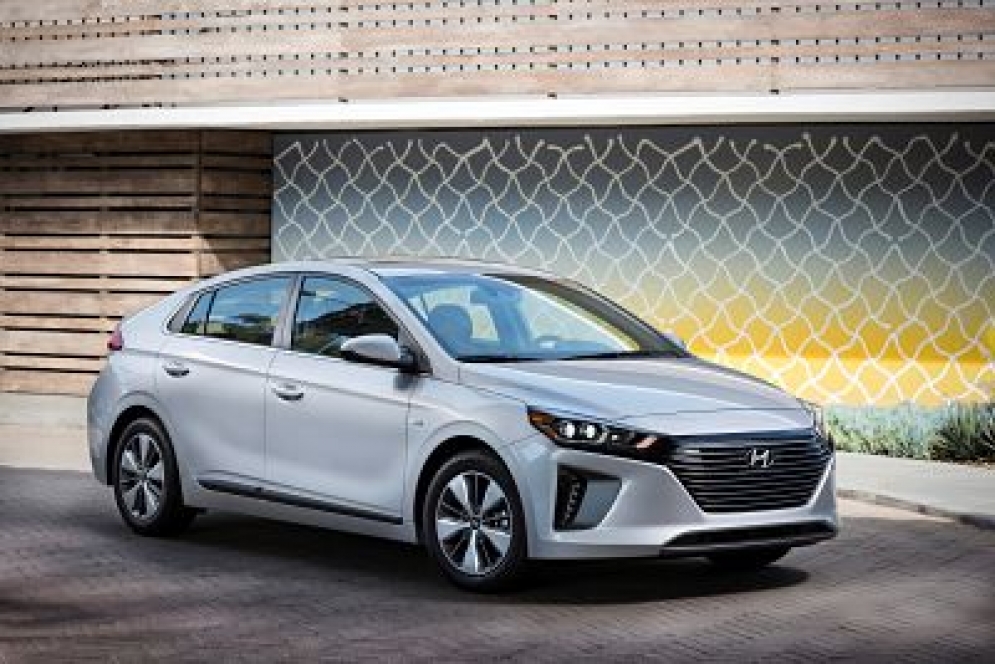HOW’s THE RIDE?
The Ioniq plug-in hybrid is powered by a 1.6-liter direct injection 4-cylinder engine, plus an electric motor (44.5 kW) and an 8.9 kWh Lithium-Ion Polymer Battery System. This works with a 6-speed automatic transmission (not a CVT).
Combined power from the hybrid system is 139 horsepower.
In terms of the driving experience, this vehicle is not powerful or quick to get going from a stopped position. This isn’t that type of ride, so look elsewhere if you want power — the Ioniq is about efficiency, plain and simple.
And while it’s not exactly sporty, the Ioniq handles quite well for the class — and it drives more like a normal car than many hybrids, which is a plus in this category.
The Ioniq includes vehicle stability management with traction control, anti-lock brakes with brake assist, and four-wheel disc brakes with integrated regenerative braking.
You can get the Ioniq in three different varieties: Hybrid, Plug-in hybrid, and full EV.
The plug-in hybrid is especially aimed at people who spend more of their driving time in the city, and less on the highways. One downside as that an excessive amount of road noise does get into the vehicle, especially on the highway.
RANGE/MPG
The area where the Ioniq plug-in hybrid excels is the reason it exists: Keeping you away from the pump.
The official numbers for the gas engine only are 52 miles per gallon. During my time in the vehicle, my experience was closer to the lower 40s., but some drivers have reported getting mid-50s or higher mpg, so it’s clear that how you drive will play a big factor here. And you can monitor power use via a handy graphic to see how efficient you are driving.
Most importantly, the MPGe rating of 119 MPGe is among the best you’ll find in this plug-in hybrid segment.
Between the 29 electric-only miles you can go in the plug-in Ioniq, and the strong gas mileage, you can drive more than 600 miles between fill-ups — so you’ll rarely see the gas station, especially if you charge regularly and have a short commute. If you drive under 30 miles total in your commute back and forth to work, you may never have to kick in the gas.
Charging the Ioniq plug-in hybrid takes just over two hours with a 220V plug, and about 8.5 hours with a standard 110V plug (so it’s worth the upgrade to your charging capabilities).
Going with the full-EV Ioniq will get you 136 MPGe, and a 124-mile range. But I would recommend the plug-in hybrid over the full EV, as the plug-in allows you to be full-EV when you want it, but also a standard hybrid when you need it. There’s much less range anxiety on the plug-in, which still matters in areas where the infrastructure for charging is lacking.
TECHNOLOGY, SAFETY
There are a wide variety of safety features included on the Ioniq plug-in hybrid, though many are only offered in the more pricey Limited trim level.
All Ioniq models get a bevy of airbags (Front, front side impact, side curtain and driver knee). The Limited model features Automatic Emergency Braking and Lane Keep Assist System, and Blind Spot Detection with Rear Cross-Traffic Alert and Lane Change Assist.
Smart Cruise Control is a helpful feature, as are Proximity Key Entry and Push Button Start.
In terms of technology, you are well-covered in the Ioniq.
There is a 7-inch color touchscreen in the easy-to-use infotainment system. Music comes from sources including AM/FM/HD radio, USB and AUX input jacks. You get 90 days free of SiriusXM satellite radio, Android Auto and Apple CarPlay integration, and easy-to-connect Bluetooth for streaming phone calls and audio. I also was impressed with how the Ioniq handled voice commands.
You also get access to the Hyundai Blue Link Connected Car system, which uses telematics to provide vehicle health reports, automatic crash notifications, and also uses mobile apps to provide drivers the option for Remote Start and locking/unlocking the vehicle. Vehicle charging can also be managed remotely through the Blue Link phone app.
PRICE
My test vehicle was priced just over $33,000; base price starts about $26K for the Ioniq plug-in hybrid, $23K for the standard hybrid and $31K for the full EV.
This is pretty affordable, considering how far one fill-up will take you.
Going up trim levels will bump the price, but give you features such as leather seating, adaptive cruise control, and lane keeping assist. that will bump up the price include adaptive.
Also keep in mind that Hyundai offers among the absolute best warranties in the business, including:
— 5-year, 60K new vehicle warranty
— 10-year, 100K powertrain warranty
— 10-year, 100K hybrid system components warranty
— Lifetime hybrid battery warranty
— 7-year, unlimited mile anti-perforation warranty
— 5-year, unlimited mile roadside assistance
BOTTOM LINE
For car buyers seeking an eco-friendly vehicle with excellent fuel mileage, and who don’t require a lot of power in their ride, the 2019 Hyundai Ioniq Plug-In Hybrid is one of the better options on the market.
It won’t win any races and isn’t the fanciest vehicle, but it will get you a long way between fill-ups. And that’s kind of the point.
=====
AutoTechReviews.com can be found on Twitter @AutoTechReview, or stay updated at the AutoTechReviews Facebook page.
Matt Myftiu can be found on Twitter @MattMyftiu.



